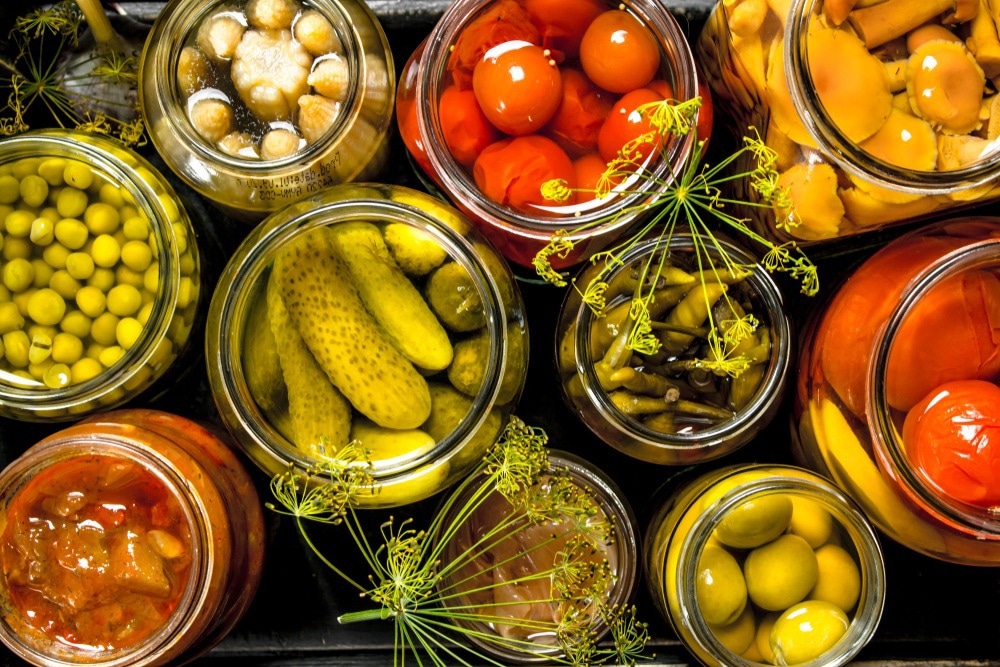Research has shown that consuming fresh vegetables is associated with a lower incidence of cardiovascular disease (CVD).
The question that remains unclear is whether preserving vegetables leads to an increased risk of CVD and mortality.

Study: Preserved vegetable consumption and its association with mortality among 440,415 people in the China Kadoorie Biobank. Image Credit: Chatham172/Shutterstock.com
Background
Salting is a commonly used food processing method to prolong the expiration date of perishable foods. Approximately 0.68 billion people consume preserved vegetables in China.
This is mainly made by placing fresh vegetables into a brine. Besides domestic consumption, tons are exported overseas year after year.
Recent research has shown that higher consumption of preserved vegetables was correlated with esophageal squamous cell carcinoma (ESCC) and esophageal cancer.
It has also been shown that the risk of gastric cancer rises by 15% for every additional 40 grams of pickled vegetable intake per day.
In the context of the Chinese population, the associations between the consumption of preserved vegetables and CVD morbidity and mortality have not been assessed.
This assessment is crucial because, in China, CVD mortality contributed to more than 40% of all deaths in 2013, and about 94 million people suffered from CVD in 2016.
About the study
To fill the gap mentioned above in the research, the current study analyzed a large prospective cohort of 440,415 participants to assess the association between all-cause, CVD, and cancer mortality in China and preserved vegetable intake on the other.
The participants examined here were enrolled from ten diverse regions aged 30–79 in China.
The enrolment was done between 2004 and 2008, with an average follow-up period of 10 years. Consumption of preserved vegetables was assessed using a validated food frequency questionnaire.
Cause-specific hazard models were constructed to estimate mortality hazard ratios (HRs) and 95% confidence intervals (CIs). Consideration was given to competing risks from various deaths.
Key findings
The current study documented 28,625 deaths during the follow-up. This included 10,392 deaths from cancer, 10,924 deaths from CVD, and 7,309 from other causes.
Consumption of preserved vegetables was observed to be only marginally associated with a higher risk of CVD mortality.
Regarding causes of death, the consumption of preserved vegetables was linked to higher hemorrhagic stroke mortality. It was also associated with higher mortality from digestive tract cancer, especially esophageal cancer.
In addition, preserved vegetable consumption was related to increased blood pressure and BMI at baseline.
A previous Chinese study showed that daily or occasional intake of salt-preserved vegetables was associated with a 10% higher all-cause mortality among individuals aged 80 years and above.
Here, no significant relationship for total mortality was observed and only a marginally increased risk of death from CVD was documented.
A high level of sodium in salt-preserved vegetables was considered to be the key driving factor behind the increased risk of death from CVD.
Strengths and limitations
Key strengths of the current study include its large sample size, relatively long follow-up duration, and the high number of deaths from various causes. This study is the first to investigate the association between cause-specific mortality and preserved vegetable consumption.
Another strength of the study lies in its accounting for confounding factors, such as other dietary and non-dietary factors and competing risks from various deaths. A series of sensitivity analyses were also conducted to prove the robustness of the findings.
Regarding limitations, the agreement between self-reported and actual preserved vegetable consumption could not be checked.
Also, information on recipes, types, or preserving techniques of preserved vegetables was not collected. These factors are likely to vary significantly with all-cause and cause-specific mortality.
Furthermore, despite constructing multivariable-adjusted models and adjusting for various confounders, residual confounding could not be ruled out. Residual confounding could be due to many factors, such as other preserved foods and socio-economic status.
Lastly, owing to the observational nature of the study, causality could not be established.
Conclusions
It was observed that the intake of preserved vegetables was marginally associated with a higher risk of CVD mortality in the Chinese population.
Frequent consumption of preserved vegetables could be a risk factor for death from hemorrhagic stroke and esophageal cancer.
Given the popularity of pickled vegetables and salt-processed vegetables in China, it is important to limit the consumption of preserved vegetables.
This might be beneficial for overall health and longevity. More research should establish the causal effects of preserved vegetables prepared by different processing methods on overall health.